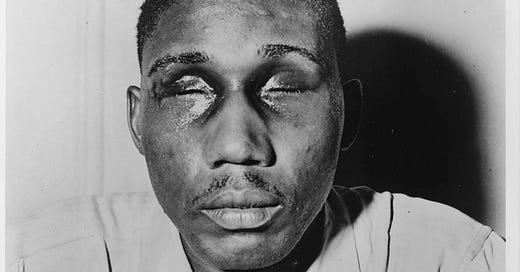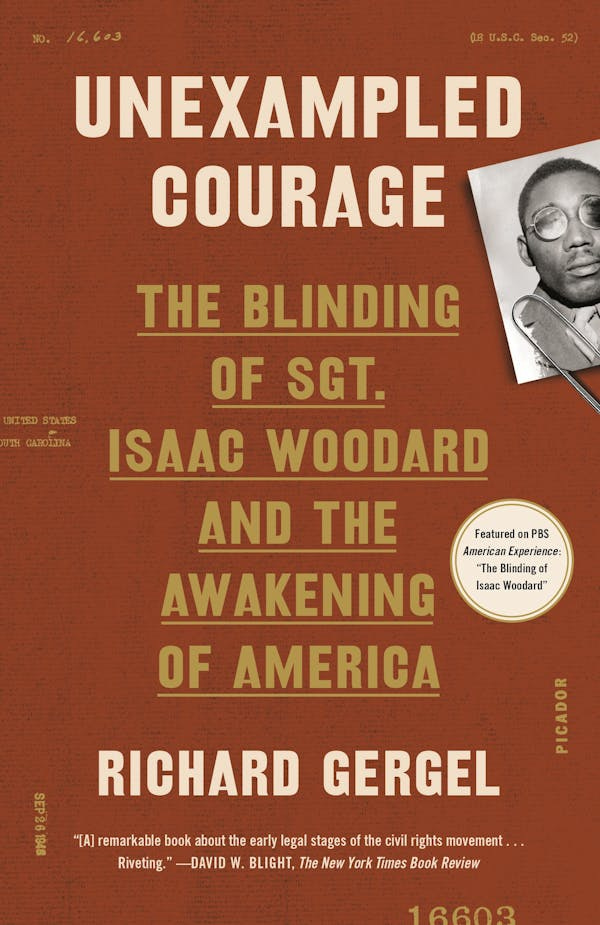The Racially Provoked Beating of Sgt. Isaac Woodard
How His Case Ignited Calls for Racial Equality and Justice
By Guest Contributing Writer Marc Friedman
No one could have foreseen the extraordinary consequences of a discharged Black American soldier’s need to use a Georgia restroom. Yet, that simple act fueled the collapse of Jim Crow and inspired the Civil Rights Movement in America.
"Unexampled Courage" by Richard Gergel, a South Carolina Federal Judge, is a compelling and meticulously researched account that intertwines legal history, civil rights, and personal acts of courage. The book centers around three pivotal figures: Judge J. Waties Waring, Sergeant Isaac Woodard, and NAACP lawyer Thurgood Marshall, whose stories collectively illuminate the profound societal shifts in post-World War II America.
As Gergel amply demonstrates, these three exemplified “unexampled courage,” meaning courage for which no precedents or parallels existed.
In February 1946, having just been discharged from the Army, Sergeant Isaac Woodard, a 26-year-old decorated African American World War II veteran, was riding a Greyhound bus from Camp Gordon in Georgia to North Carolina to reunite with his family. When the bus reached a rest stop near Augusta, Georgia, Woodard politely asked to use the restroom. Though the bus driver was irritated by Woodard’s request, he reluctantly acceded, Woodard visited the restroom, and the trip continued without incident.
When the bus next stopped in Batesville, South Carolina, the bus driver contacted the local police who forcibly removed Woodard from the bus, asked to see his discharge papers, and then took Woodard to an alleyway where they brutally beat him with their fists and nightsticks. They then jailed Woodard for his “disorderly conduct.”
While Woodard was in jail, local Police Chief Lynwood Shull asked Woodard if he had been discharged from the Army. When Woodard answered “yes” instead of “yes sir,” Shull started beating Woodard with a blackjack, striking him violently in each eye. Woodard was permanently blinded. Woodard, then blind, then appeared in court, was fined $50 and released.
Woodard's case gained national attention and became a rallying point for the Civil Rights movement, then in its infancy. Gergel skillfully portrays the widespread public outrage that followed, illustrating how this incident, among others, highlighted the stark contradictions between America's democratic ideals and its racial realities. The brutality faced by Black veterans like Woodard, who bravely fought for freedom abroad only to be denied basic human rights at home, underscored the deep-seated racism that permeated American society.
Seven months after Woodard’s beating, the Executive Secretary of the NAACP, Walter F. White, met with President Harry S. Truman to discuss the Woodard case. Truman exploded, immediately directing the Department of Justice to open an investigation. Shortly thereafter, Shull and other police were indicted in South Carolina for beating Woodard.
One of the most compelling aspects of “Unexampled Courage” is its portrayal of Judge J. Waties Waring, a Southern patrician whose transformation from a traditional segregationist to a progressive champion of civil rights is both remarkable and inspiring.
Waring was the judge who oversaw the trial of Shull and his co-defendants. When the defendants were acquitted by an all-white jury, Waring had a personal and judicial transformation that, as described below, profoundly influenced American history. Waring's journey from a staunch supporter of Jim Crow laws to a pivotal spokesperson for racial equality is a testament to the power of empathy and moral courage.
How did Judge Waring’s newfound and deep commitment to racial equality influence American history? In “Unexampled Courage,” Gergel highlights Judge Waring's landmark decisions, which laid the groundwork for the legal battles that followed. Waring's dissent in Briggs v. Elliott, a precursor to the historic Brown v. Board of Education decision was particularly significant.
In his dissenting opinion, he boldly and explicitly declared that "segregation is per se inequality," a radical stance that challenged the deeply entrenched doctrine of "separate but equal" that existed since the U.S. Supreme Court’s notorious 1897 decision in Plessy v. Ferguson. Waring’s bold statement stands at the very heart of Brown v. Board of Education.
Thurgood Marshall, who would later become the first Black Supreme Court Justice, also plays a significant role in "Unexampled Courage." Gergel vividly depicts Marshall's relentless pursuit of justice, his strategic brilliance, and his unyielding determination in the face of formidable challenges. He effectively demonstrates how Marshall's efforts, combined with Waring's willingness to defy societal norms, sometimes at significant risk to Waring and his family, helped to fuel the Civil Rights Movement. Both Waring and Marshall showed “unexampled courage.”
Beyond directing the Department of Justice to investigate and prosecute Shull and others, the Woodard case had another profound effect on Truman. Following his meeting with NAACP Secretary White, Truman established the Federal Civil Rights Commission. Based on the Commission’s report, the President sent a package of Civil Rights laws to Congress in 1948.
In addition, over the strong objection of military leaders and political leaders across the spectrum, including many fellow Democrats, Truman issued two Executive Orders banning racial discrimination in America’s military and ordering that all branches of the Federal Government be integrated. These, too, were acts of “unexampled courage.”
The strength of "Unexampled Courage '' lies in Gergel's ability to weave these individual stories of “unexampled courage” into a broader historical context. His narrative is rich with historical detail, providing readers with a nuanced understanding of the social, political, and legal landscapes of mid-20th century America. Gergel's meticulous research and engaging prose bring these historical figures to life, making their struggles and triumphs resonate powerfully.
“Unexampled Courage” serves as both a historical account and a call to action, urging readers to consider the ongoing struggle for racial equality and justice in America. The book's title itself, "Unexampled Courage," speaks to the extraordinary bravery required to confront entrenched systems of oppression and the enduring need for such courage in today's world. Gergel poignantly writes:
“In the midst of what seemed to be an unsolvable [racial] crisis in American government and character, courageous citizens, recognizing the demands of the times, stepped forward to challenge the racial status quo. Most had little to gain and much to lose. These remarkable citizens willingly took a stand for a more just and inclusive society against the tide of public opinion. Such courageous citizenship is indispensable to the maintenance of democratic institutions and practices.”
No doubt Gergel’s prescription for service to America is as relevant today as it was in 1946. Many of our institutions are under attack. Courageous citizenship is, indeed, indispensable to the maintenance of our Democracy. For anyone interested in Civil Rights history, legal history, the ongoing quest for racial equality, and the preservation of American Democracy, “Unexampled Courage'' is an essential read.
Mr. Friedman was a trial lawyer for five decades and a law professor at two law schools. He graduated from The Johns Hopkins University with a B.A degree in Philosophy and The George Washington University Law School earning a Juris Doctor degree, with honors.








Thank you!